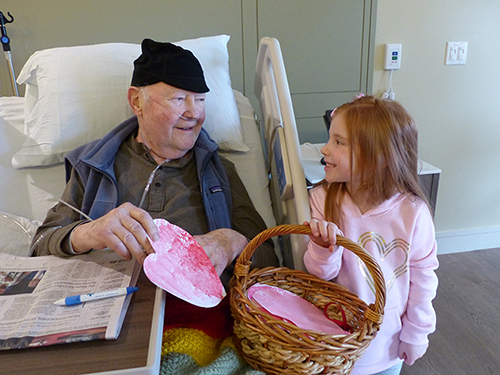How can we help?
888-283-1722
Call us now at 888-283-1722
24/7 Referrals and Nursing Support
Voices of Care Blog

How to Help a Grieving Child Return to School
Posted on August 31, 2017 by Care Dimensions Children's Program Staff As summer draws to a close, the transition from a relaxed schedule to a more structured school routine can elicit a variety of emotions and anxieties for children and caregivers, especially those who have experienced the death of someone close.After a child experiences a significant loss, these feelings can be amplified and make the transition seem overwhelming. Here are some tips to help your family navigate the back-to-school transition.
Talk with your child
Have a talk with your child about their fears, worries, and anxieties about going back to school. Discuss how to share information regarding their loss, who would they like to tell, how much detail do they want to share, and how can they respond if classmates ask them about the death. Some children may feel comfortable telling their peers about the death, and others may wish to keep this private. Validate how your child is feeling, and help support them along this journey.Communicate with the school
Whether your child wants their teachers to know minimal information or full details about the loss, teachers should watch for any unusual behavior or signs that your child may be having a difficult time. By communicating with your child’s teachers, you can also address any potentially sensitive academic topics throughout the year and begin talking with your child about coping strategies.Talk about the positives and past coping skills
Have conversations about things that your child is looking forward to this coming year: seeing old friends, special field trips, and new experiences. It is okay that some of these topics may bring up feelings of anxiety. Explain that it can be hard to hold feelings of happiness and excitement when, at the same time they might be holding feelings of sadness and anxiety. Remind them of other difficult times at school . . . how did they get through that? What or who was helpful to them? While this loss is different from anything they’ve ever experienced, many of their coping skills from past struggles will help them move forward.Identify a supportive staff person
Is there a school staff member with whom your child feels comfortable? Ideally, this can be a person your child feels comfortable speaking with throughout the day if they need support. This may be a guidance counselor, social worker, the principal, nurse, coach, or a past teacher. If possible, reach out to that supportive staff person and arrange a brief check-in during the first few weeks.If your child is feeling anxious about how to respond to classmates when asked about the death, engage your child in some role playing at home and practice simple responses. For instance, “Thank you for asking, but I would like to focus on school right now.” “I would rather not talk about that, but thank you for asking. Would you like to sit together at lunch today?” Or, “Some days are a lot harder than others. I’ll let you know if I want to talk about it.” Let your child know that they do not have to share any information that they are not comfortable sharing. Remind them that it is okay to talk about their loss and you or a teacher can help them find people who will listen if they don’t feel like their friends will be open to this.
Watch for signs that your child may need extra support
 As the school year begins, if you notice a drastic change in your child’s work habits or grades, they might benefit from learning additional coping skills. It may be difficult for your child to focus during the school day and to keep up with homework while grieving. While this is a normal reaction, intervene if you notice a continual decline. Conversely, you may notice your child begin to fully immerse themselves in their academics; school and work can be used as tools to avoid grief. Try to encourage time for academics and personal activities. Lastly, if your child seems to lose interest in their extra-curricular activities or peer relationships, they may benefit from talking with a certified child life specialist or attending a bereavement support group.
As the school year begins, if you notice a drastic change in your child’s work habits or grades, they might benefit from learning additional coping skills. It may be difficult for your child to focus during the school day and to keep up with homework while grieving. While this is a normal reaction, intervene if you notice a continual decline. Conversely, you may notice your child begin to fully immerse themselves in their academics; school and work can be used as tools to avoid grief. Try to encourage time for academics and personal activities. Lastly, if your child seems to lose interest in their extra-curricular activities or peer relationships, they may benefit from talking with a certified child life specialist or attending a bereavement support group.Every child copes with grief and transitions differently, and while going back to school may be a welcomed routine for some, it also may be very difficult for others. Keep an open discussion with your child and your child’s school about this transition.
Care Dimensions has certified child life specialists who can help guide children and teens through the difficult times that follow the loss of someone special. Learn more about our upcoming support groups for children and caregivers at https://www.caredimensions.org/grief-support/childrens/. For additional information and support for children and families who are grieving, please contact our children’s program at 855-774-5100 or email [email protected].
Additional Posts
Making Healing Connections in Grief Support Groups
Posted on March 25, 2024 by Bob Hagopian, M.Div., and Mary Beth GrimmCare Dimensions grief support groups offer a safe place where people who are grieving a loss can share their feelings with others who are in a similar situation. ...
Continue readingHow to Support Your Child When Visiting a Hospice Patient
Posted on March 6, 2024 by Care Dimensions Children’s Program Staff in Children, HospiceCare Dimensions child life specialists offer tips for parents to prepare their children for visits with loved ones who are receiving hospice care. ...
Continue readingRemembering Loved Ones Around the Holidays
Posted on December 14, 2023 by Patrice DePasquale, MSW, LICSW, and Samantha McCarthy, MS, CCLSTo honor, remember, and celebrate your loved one around the holidays, try some of these rituals with your family. ...
Continue readingAnyone—patient, family, care provider—can make a referral. Fill in the form online or call us today.
Since 1978, Care Dimensions, formerly Hospice of the North Shore, has provided comprehensive and compassionate care for individuals and families dealing with life-threatening illnesses. As the non-profit leader in advanced illness care, we offer services in over 100 communities in Massachusetts.
Copyright 2024 | Care Dimensions, 75 Sylvan Street, Suite B-102, Danvers, MA 01923 | 888-283-1722 | 978-774-7566 |










